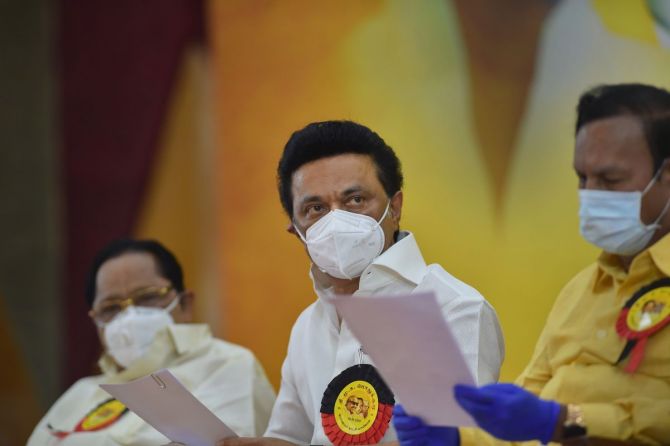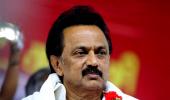MK Stalin’s ruling AIDMK rival does not thankfully face such problems as he did, but its problems could be worse if saner counsel does not prevail between now and the assembly polls, warns N Sathiya Moorthy.

Seven months is a lot of time in contemporary Indian politics. But not to take a chance, the Opposition Dravida Munnetra Kazhagam in Tamil Nadu has conducted an online general council meeting, in place of the one slated for end-March and which was cancelled due to the Covid lockdown.
The idea was to put organisational matters behind the party, before they prepare for the state assembly polls, due by May next.
This, in turn, has flagged questions about what the ruling All India Anna DMK is up to on the very same front.
The DMK general council, reportedly attended by over 3,000 members, unanimously elected former state minister S Duraimurgan as party general secretary and parliamentary group leader T R Baalu as treasurer in the former’s place. The general secretary’s post fell vacant following the death of party veteran K Anbazhagan, 98, on March 7.
The general council also amended the party constitution to increase the number of deputy general secretaries from three to five, to accommodate former Union minister A Raja and Tindivanam district secretary and former state minister K Ponmudi.
There are three other general secretaries, namely, Subbulakshmi Jagadeesan, Anthiyur Selvaraj and I Periyasamy.
Kanimozhi Karunanidhi will continue as women’s wing president and party chief M K Stalin’s actor-son Udhayanidhi, as youth wing head.
The presence of Anthiyur Selvaraj and the elevation of ex-minister Raja means that the DMK is possibly the only big party in the state with two Dalits on the party presidium.
As Raja himself pointed out in response to a media report a day before his elevation, the DMK is the only party that amended is constitution in the time of the late patriarch, M Karunanidhi, to provide for a Dalit representative at all levels of the organisational structure.
The general council became necessary to set at rest avoidable rumours about Stalin’s choice for the general secretary’s post. Earlier, reportedly on advice from above, Duraimurgan had put in his papers as treasurer, but owing to the delayed general council, his elevation got halted.
For official purposes, he was asked to withdraw his resignation, and the district secretaries, at a virtual meeting, empowered party president M K Stalin to discharge the general secretary’s functions, as well.
The elections now have reversed the trend, and ended mischievous social media speculation on choice for the number two and three posts in the party.
Seniority too was kept in mind in doing so, as the campaign from outside the party whispered the names of imagined aspirants, and the leadership did not want it to spoil the cadre mood during the run-up to the assembly polls.
The ruling AIDMK rival does not thankfully face such problems as such, but its problems could be worse if saner counsel does not prevail between now and the assembly polls.
The party does not face any organisational hiccups, and under the statute amended after Jayalalithaa’s death, deputy chief minister O Panneerselvam (OPS) and chief minister Edappadi K Palaniswami (EPS) will continue as coordinator and joint coordinator for another three years.
But trouble for the AIADMK showed up its head after a section of the party, including some ministers, projected EPS as the party’s chief ministerial candidate when no high-level discussions had taken place.
This was followed by another section promoting OPS as the CM candidate, through wall posters in his native Theni district, on the morning of Independence Day. This drove up tensions, until a group of senior ministers sorted out the matter with the top two. But it is not unlikely to flare up in the coming months.
The argument is that the party having won the 2016 assembly elections with Amma as incumbent chief minister and mascot, both EPS and OPS were continuing on reflected glory.
Given the complexities caused by the split when OPS walked out after being forced out of the chief ministership and the hurt sentiments on his side after reunification, it would be a better idea to continue to promote the current government and leadership as that of Amma’s, and decide on the chief minister, if it came to that, post-poll.
In this context, reference is being made to how Jayalalithaa, from her hospital bed, had approved of OPS, chief minister for short terms in her place twice earlier, to step in for a third time.
Against this, EPS was the choice of ‘Chinnamma’, or V K Sasikala Natarajan, Jayalalithaa’s live-in confidante now serving the closing weeks/months of her four-year prison term in Bengaluru.
While a clear distinction is being drawn between the mentor of the two current leaders, it is also pointed out that the coordinator’s post becomes even more important if the party lost the assembly polls, until when alone the chief minister’s job will look more attractive.
The suggestion hence is for EPS to retain his supremacy in government affairs and let OPS do so within the organisation. Any clash of interests or crossing of territory could mean doom for the party, more so ahead of the elections.
Under the amended party constitution, both coordinator OPS and joint coordinator EPS had to jointly select AIADMK nominees for various elections.
Both of them also had to sign what is known as the B-Form, for the Election Commission (EC) to allot the registered ‘Two Leaves’ symbol of the party for individual candidates, an authority earlier entrusted exclusively with Jayalalithaa as general secretary.
Any revival of the chief ministerial choice in the run-up to the elections could well jeopardise this mandatory process, and/or could lead to the EC having to ‘freeze’ the symbol.
If it happened, it will be the first time after the post-MGR polls of 1989, when the AIADMK split after founder M G Ramachandran’s death in December 1987.
This would be a blow to MGR era AIADMK cadres and voters alike, and could spoil the chances of the party, whether they remain united or get split all over again -- in what could be the worst case scenario.
What could come as a further disincentive is the state BJP’s assertion of its willingness to go it alone if it came to that and chief L Murugan’s prediction of winning 60 of the 234 assembly seats on their own.
A weakened AIADMK is what the BJP high command may welcome and not welcome at the same time -- welcome because it could mean better seat-sharing opportunities for the party, and unwelcome because the rival DMK-Congress combine may return to power instead.
For the BJP high command that still hopes for a ‘Congress mukht Bharat’, a weakened AIADMK could imply the Congress losing its bargaining power within the DMK alliance and sticking on, on the latter’s terms.
The BJP thus will be looking for the DMK’s reaction to fielding a party nominee for the Lok Sabha deputy speaker’s post, as desired by the Congress leadership -- to see, who the Stalin leadership obliges between now and the assembly polls.
N Sathiya Moorthy, veteran journalist and political analyst, is Distinguished Fellow and Head-Chennai Initiative, Observer Research Foundation.










